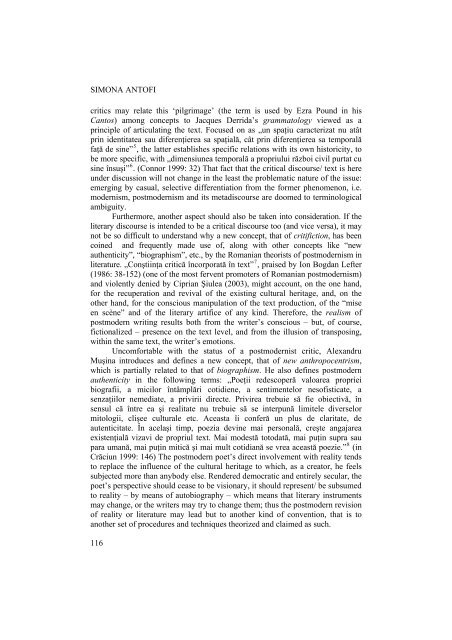culture, subculture and counterculture - Facultatea de Litere
culture, subculture and counterculture - Facultatea de Litere
culture, subculture and counterculture - Facultatea de Litere
Create successful ePaper yourself
Turn your PDF publications into a flip-book with our unique Google optimized e-Paper software.
SIMONA ANTOFI<br />
critics may relate this ‘pilgrimage’ (the term is used by Ezra Pound in his<br />
Cantos) among concepts to Jacques Derrida’s grammatology viewed as a<br />
principle of articulating the text. Focused on as „un spaţiu caracterizat nu atât<br />
prin i<strong>de</strong>ntitatea sau diferenţierea sa spaţială, cât prin diferenţierea sa temporală<br />
faţă <strong>de</strong> sine” 5 , the latter establishes specific relations with its own historicity, to<br />
be more specific, with „dimensiunea temporală a propriului război civil purtat cu<br />
sine însuşi” 6 . (Connor 1999: 32) That fact that the critical discourse/ text is here<br />
un<strong>de</strong>r discussion will not change in the least the problematic nature of the issue:<br />
emerging by casual, selective differentiation from the former phenomenon, i.e.<br />
mo<strong>de</strong>rnism, postmo<strong>de</strong>rnism <strong>and</strong> its metadiscourse are doomed to terminological<br />
ambiguity.<br />
Furthermore, another aspect should also be taken into consi<strong>de</strong>ration. If the<br />
literary discourse is inten<strong>de</strong>d to be a critical discourse too (<strong>and</strong> vice versa), it may<br />
not be so difficult to un<strong>de</strong>rst<strong>and</strong> why a new concept, that of critifiction, has been<br />
coined <strong>and</strong> frequently ma<strong>de</strong> use of, along with other concepts like “new<br />
authenticity”, “biographism”, etc., by the Romanian theorists of postmo<strong>de</strong>rnism in<br />
literature. „Conştiinţa critică încorporată în text” 7 , praised by Ion Bogdan Lefter<br />
(1986: 38-152) (one of the most fervent promoters of Romanian postmo<strong>de</strong>rnism)<br />
<strong>and</strong> violently <strong>de</strong>nied by Ciprian Şiulea (2003), might account, on the one h<strong>and</strong>,<br />
for the recuperation <strong>and</strong> revival of the existing cultural heritage, <strong>and</strong>, on the<br />
other h<strong>and</strong>, for the conscious manipulation of the text production, of the “mise<br />
en scène” <strong>and</strong> of the literary artifice of any kind. Therefore, the realism of<br />
postmo<strong>de</strong>rn writing results both from the writer’s conscious – but, of course,<br />
fictionalized – presence on the text level, <strong>and</strong> from the illusion of transposing,<br />
within the same text, the writer’s emotions.<br />
Uncomfortable with the status of a postmo<strong>de</strong>rnist critic, Alex<strong>and</strong>ru<br />
Muşina introduces <strong>and</strong> <strong>de</strong>fines a new concept, that of new anthropocentrism,<br />
which is partially related to that of biographism. He also <strong>de</strong>fines postmo<strong>de</strong>rn<br />
authenticity in the following terms: „Poeţii re<strong>de</strong>scoperă valoarea propriei<br />
biografii, a micilor întâmplări cotidiene, a sentimentelor nesofisticate, a<br />
senzaţiilor nemediate, a privirii directe. Privirea trebuie să fie obiectivă, în<br />
sensul că între ea şi realitate nu trebuie să se interpună limitele diverselor<br />
mitologii, clişee culturale etc. Aceasta îi conferă un plus <strong>de</strong> claritate, <strong>de</strong><br />
autenticitate. În acelaşi timp, poezia <strong>de</strong>vine mai personală, creşte angajarea<br />
existenţială vizavi <strong>de</strong> propriul text. Mai mo<strong>de</strong>stă totodată, mai puţin supra sau<br />
para umană, mai puţin mitică şi mai mult cotidiană se vrea această poezie.” 8 (in<br />
Crăciun 1999: 146) The postmo<strong>de</strong>rn poet’s direct involvement with reality tends<br />
to replace the influence of the cultural heritage to which, as a creator, he feels<br />
subjected more than anybody else. Ren<strong>de</strong>red <strong>de</strong>mocratic <strong>and</strong> entirely secular, the<br />
poet’s perspective should cease to be visionary, it should represent/ be subsumed<br />
to reality – by means of autobiography – which means that literary instruments<br />
may change, or the writers may try to change them; thus the postmo<strong>de</strong>rn revision<br />
of reality or literature may lead but to another kind of convention, that is to<br />
another set of procedures <strong>and</strong> techniques theorized <strong>and</strong> claimed as such.<br />
116












